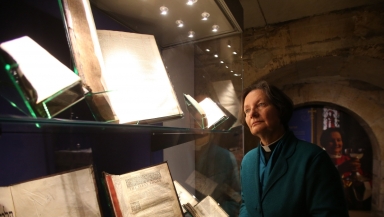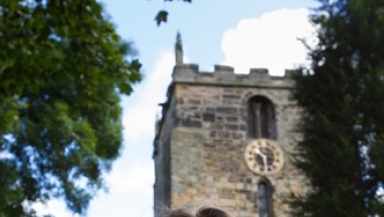After this week's General Synod, it's looking more and more likely that the Church of England will be welcoming its first female bishop sooner rather than later.
Fast-tracking measures agreed at Synod included halving diocesan consultation time and skipping the usual revision committee stage, with the expectation building that the Church of England could see its first female bishop before the end of the year.
That speculation has led to the question of "who will it be?"
Five names circulating are:
June Osborne
The Very Reverend June Osborne has already made history as the first woman to be Dean of Salisbury Cathedral in its 750-year history.
She briefly served as acting dean after the resignation of her predecessor, Derek Watson, before assuming the title officially on 1 May 2004. This also made her the first female dean of any of the Church of England's medieval cathedrals.
She studied social sciences at the University of Manchester, and later looked towards the law as a profession but after feeling "the hand of Heaven" she redirected towards Christian ministry.
She trained at St John's College in Nottingham and then at Wycliffe Hall, Oxford.
After that she became a deacon at St Martin in the Bull Ring, Birmingham, and later served in church parishes in Oxford and London.
When the ordination of women priests was being voted on in 1992, The Times credited a speech given by June Osborne with "swinging the General Synod vote in favour of female priests". It is this speech that is one of the main reasons many consider her a front runner for the Church's first female bishop.
In an interview with the Salisbury Journal, she names her hero and inspiration as Helen Keller: "Her story was my introduction to the extraordinary courage and achievement of people who are disabled."
When asked about whether breaking the law was acceptable, she replied: "Yes, for conscientious reasons, but you should then accept your punishment."
The historical figure she would most like to meet is "Walter Tull, the professional footballer who was the first black officer in the British Army".
Vivienne Faull

The Very Reverend Vivienne Faull holds the honour of being the first female Dean of York Minster, the first woman to lead a Church of England cathedral, and the first and only female provost in all of Church of England history.
She was installed to the position of Provost of Leicester Cathedral in 2000, a role whose responsibilities are indistinguishable from those of a dean. Which is why in 2002 her title, and the title of all the other provosts, was changed to dean.
Before her ordination in 1994 she studied history at St Hilda's College, Oxford, after which she became conflicted about where to go next.
Although she wanted to enter ministry, her mother objected, regarding it as a waste of her education as there were so few opportunities for women at the time.
Speaking to York Press she admitted to "running away from the Church" for a few years, while she worked for a few years as a teacher in the Church Mission Society in Northern India.
Later, she became one of the first female deacons in the Diocese of Ely in 1987.
In 1990 she became chaplain of Gloucester Cathedral, a post that lasted 10 years before her move to Leicester.
Speaking to York Press about gay marriage, she said: "If we go with the Government and say we want to support gay marriage, how does that fit with what we say about marriage being between men and women?
"We have to take it step by step. But I hope that by the time I die we can see an acceptance of these sorts of partnerships as being something that can reflect the love of God."
When asked about whether she would want to be the first female bishop, she said: "Oh gosh! I think my best answer at the moment is that my calling is to be Dean of York."
Lucy Winkett
One of the younger possible candidates, the Reverend Lucy Winkett is the Rector of St James's Church in Piccadilly, and before that she was the first woman to be appointed a canon at St Paul's Cathedral.
After studying history at Cambridge and theology at Birmingham, she then went on to attend the Royal College of Music.
Ordination wasn't her first career choice. Before feeling the call to ministry, she was a professional singer, and has been heard performing renditions of Aretha Franklin's 'Natural Woman' while playing the piano after a Sunday morning service.
"Contemporary ministry in the Church of England seems to be, as the sculptor described the music of Bach, modern like the waves, old like the sea," she said in an piece she wrote for New Statesman.
Her career in the Church of England has caused controversy. When she was appointed to St Paul's, some refused to offer her communion. Canon John Halliburton, the Chancellor of St Paul's at the time of her appointment in 1997, said in the Times: "I don't believe her to be a priest."
He described her appointment as "typical of the liberal agenda" and boycotted her first service.
But the Very Reverend Dr John Moses, the then Dean of St Pauls, was also quoted in the Times as saying: "We are not playing gender politics. We appointed her because she was the best candidate for the post."
He then later said that it was her Soprano singing abilities which ultimately put her ahead of the pack.
Last December, in her role as Rector of St James's, she had garnered international attention, both good and bad, for overseeing the construction of a life sized replica of the Israeli security fence that passes very close to Bethlehem.
Despite criticisms of potential anti-Semitism or just simple partisanship in a complicated and nuanced international conflict, Reverend Winkett defended her project, which was entitled "Bethlehem Unwrapped", by claiming in the Guardian that she was practising the Palestinian principle of "beautiful resistance".
Rose Hudson-Wilkin
Reverend Rose Hudson-Wilkin is the first black woman to serve as chaplain to the Speaker of the House of Commons.
Her appointment was acrimonious to say the least. The Speaker of the Commons, John Bercow, appointed her against the wishes of the Dean of Westminster, who traditionally advises who should take the role.
So determined was Mr Bercow that he should not have to work with what he described in the Daily Mail as "another predictable middle-aged white man", he severed the ties between the Parliament and Westminster Abbey, which has been the traditional location of state weddings, coronations, and funerals.
Reverend Hudson-Wilkin is Jamaican born and grew up in one of the most deprived parts of East London. "I didn't grow up feeling sorry for myself and thinking, 'Oh, gosh, I'm poor,' because that was the life of everyone around you," she said to NPR. "When a dice has been thrown and that is your life, you learn to live with your life. You grow from it."
Speaking about her time as a vicar in Hackney in 1998, she said in the Daily Mail: "Some members struggled with me. They had been told that no priest worth anything would want to come here. On top of that I'm a woman and black."
She has been a leading figure in campaigning for the Church of England to apologise for its role in the Atlantic slave trade, as well as opposing racism within the Church.
She has also chastised her own community. Speaking to a majority black church one time, she contended that "You all riot when police kill a black man. And yet in the last 10 years, we have killed in our community over 300. What are you saying about the value of life?"
When asked if she thinks it likely that she could be the first woman bishop, Reverend Hudson-Wilkin replied: "I believe in miracles."

Miranda Threlfall-Holmes
A former atheist, and something of a confrontational figure, Miranda Threlfall-Holmes is the chaplain of Durham University, as well as being an honorary fellow to its department of history, and the vicar of Belmont & Pittington in Durham.
Quoted on the website of Anglican Mainstream, she describes her journey to faith as the result of a "messy situation" during her time at Cambridge University.
Ultimately, she said the atheist's prayer "Dear God, if there is a God, please sort this out" and God responded.
"Suddenly God was there in the room in a way that is impossible to describe, but He was definitely there." Her response was to swear violently. The next day, the problem that had been troubling her "melted away".
Several months later, sitting in an empty church pondering whether to accept a job offer, she heard a voice answer her 'Be a vicar'. She turned around, but there was no one there. "I fought against it for a good couple of years but in the end I could not do anything else."
She entered training at St John's Theological college in Durham, and later co-founded the pressure group WATCH, Women And The Church, which campaigned for the advancement of women in all areas of the Church.
Upon becoming a vicar however, and later taking a place in the General Synod, she quickly displayed an uncompromising streak that could harm her chances in the current environment.
In the July Synod of 2008 she proposed a motion that simply sought the ordination of women bishops with no conditions or code of practice to accommodate those who had strong theological objections. This was soundly defeated.













